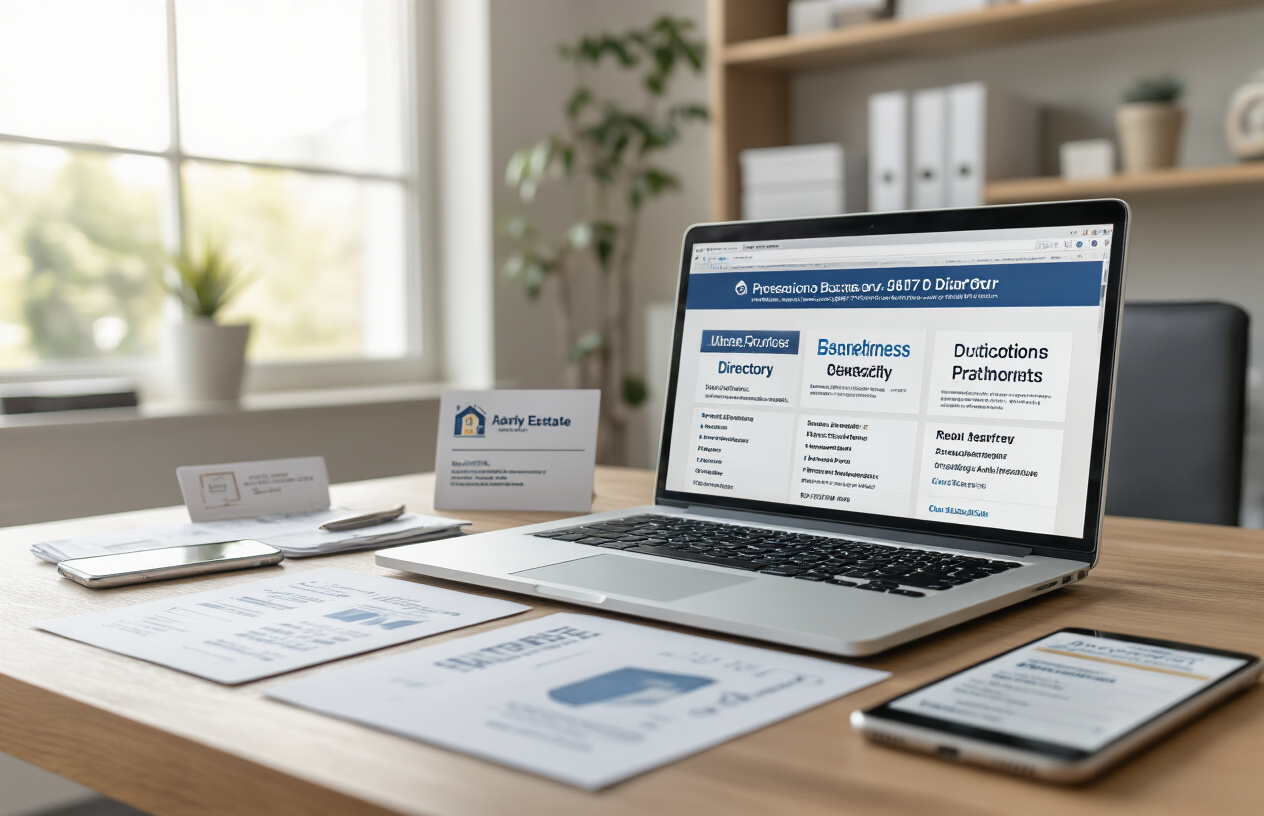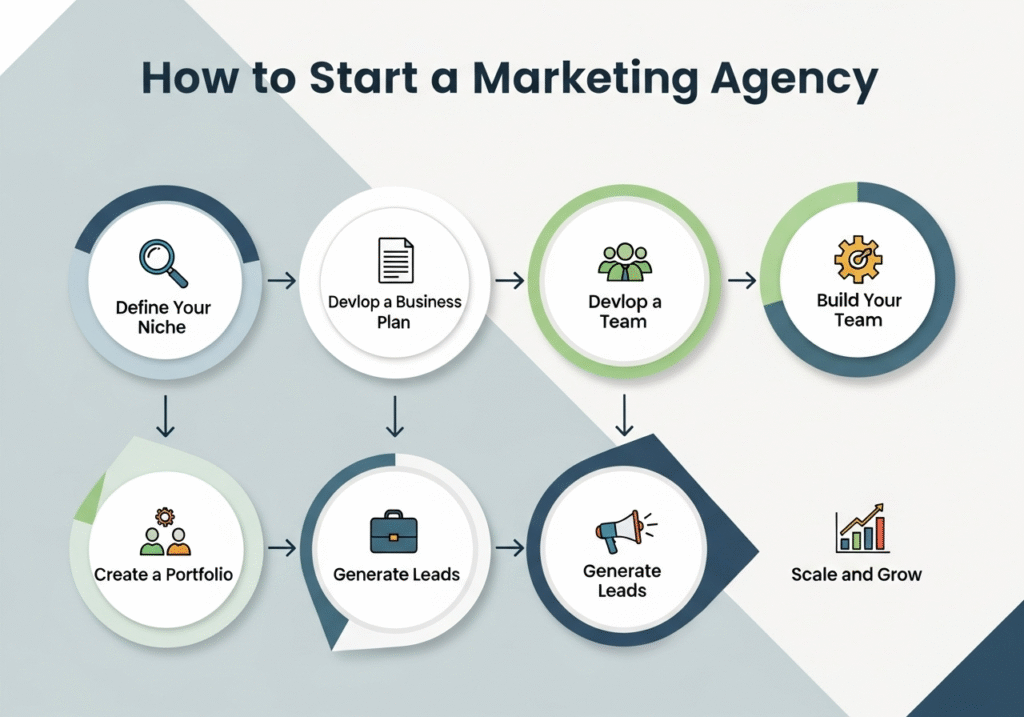Real estate agents face fierce competition in today’s digital marketplace, where potential buyers and sellers start their property search online. Local SEO for real estate agents has become the game-changer that separates successful agents from those struggling to get noticed in local search results.
This guide is designed for real estate professionals, realtors, and agents who want to dominate their local market and attract more qualified leads through strategic online visibility. You’ll discover proven real estate SEO tips that help you rank higher when people search for properties and agents in your area.
We’ll walk through the essential local SEO fundamentals that form the foundation of your digital success, including how search engines connect local buyers with nearby real estate professionals. You’ll also learn to optimize your Google Business Profile to become the go-to agent in your neighborhood, turning casual browsers into serious prospects. Finally, we’ll cover building location-based content that speaks directly to local buyers and sellers, helping you establish authority in your specific market areas.
Understanding Local SEO Fundamentals for Real Estate Success

Key differences between traditional SEO and local SEO strategies
Traditional SEO focuses on ranking for broad keywords nationally or globally, while local SEO for real estate agents targets geographically specific searches within your service area. The biggest difference lies in user intent – traditional SEO captures general information seekers, but local SEO connects with ready-to-act buyers and sellers in your neighborhood.
Traditional SEO might target “buy house tips,” but real estate local SEO strategies focus on “homes for sale in [city name]” or “real estate agent near me.” This geographic specificity means your competition shrinks from millions of websites to just local real estate professionals, making it easier to dominate your market.
Local SEO also relies heavily on location signals like Google Business Profile, local citations, and geographic keywords. Traditional SEO emphasizes backlinks and domain authority, while SEO for realtors prioritizes proximity, relevance, and prominence in local search results.
| Traditional SEO | Local SEO for Real Estate |
|---|---|
| Broad, national keywords | Location-specific keywords |
| Domain authority focus | Google Business Profile optimization |
| General backlinks | Local citations and directories |
| Information-seeking traffic | Ready-to-transact leads |
How local search algorithms impact real estate visibility
Google’s local search algorithm uses three primary factors to determine which real estate agents appear in local results: relevance, distance, and prominence. Relevance measures how well your business information matches what people search for. If someone searches “real estate agent downtown Phoenix,” Google checks if your profile mentions these specific terms.
Distance plays a crucial role in real estate lead generation SEO. Google considers both the searcher’s location and your business address when ranking results. This means agents with offices in prime locations have advantages, but those in surrounding areas can still compete by optimizing for neighborhood-specific searches.
Prominence combines your online reputation, review quantity and quality, local citations, and overall web presence strength. Google’s algorithm weighs positive reviews heavily – a real estate agent with 50 five-star reviews will typically outrank competitors with fewer reviews, even if those competitors have better websites.
The algorithm also considers real-time factors like current search trends, seasonal patterns (like spring home buying seasons), and mobile location data. This dynamic nature means your visibility can fluctuate based on market conditions and searcher behavior patterns.
Essential local ranking factors that drive qualified leads
Google Business Profile optimization stands as the most critical factor for local search optimization real estate success. Complete profiles with accurate business information, regular posts, high-quality photos, and consistent customer interaction signals to Google that you’re an active, legitimate business serving your community.
Online reviews directly impact both rankings and lead quality. Properties with 15+ recent reviews typically receive 35% more clicks than those with fewer reviews. The review velocity – how often you receive new reviews – matters more than total count. Fresh reviews show active business and current client satisfaction.
Local citations across real estate directories, chamber of commerce listings, and local business directories create authority signals. Consistency in your Name, Address, and Phone number (NAP) across all platforms tells Google your business information is reliable and trustworthy.
Website content targeting neighborhood-specific keywords helps capture hyper-local searches. Creating pages for “homes in [subdivision name]” or “[neighborhood] real estate market trends” positions you as the local expert for those specific areas.
Real estate digital marketing success also depends on:
- Location-based landing pages for different service areas
- Local schema markup on your website
- Integration with MLS data for local property listings
- Social media engagement with local community groups
Mobile search behavior patterns of homebuyers and sellers
Mobile devices drive 60% of all real estate searches, with the majority happening during evening hours and weekends when potential buyers have time to browse. These searchers typically use more conversational, voice-search-friendly queries like “good real estate agents near me” or “houses for sale in my area.”
Location-based mobile searches spike during specific activities – people often search for nearby agents while driving through neighborhoods they’re interested in, or while attending open houses. This “micro-moment” behavior means your real estate agent online marketing needs immediate accessibility and clear contact information.
Mobile searchers expect instant results and quick phone connections. Pages that load slowly or require excessive scrolling lose 53% of mobile visitors within three seconds. Your contact information should be prominently displayed and clickable for immediate calls or texts.
Real estate SEO tips for mobile optimization include:
- Click-to-call phone numbers prominently displayed
- Quick-loading image galleries of listings
- Easy-to-complete contact forms
- Location-based search functionality
- Integration with mapping applications
The rise of voice search particularly impacts real estate mobile behavior. People ask their phones questions like “What’s my home worth?” or “Show me open houses this weekend.” Optimizing for these natural language patterns helps capture this growing search segment and improve real estate local search ranking performance.
Optimizing Your Google Business Profile for Maximum Impact

Complete Profile Setup with Accurate Business Information
Your Google Business Profile serves as your digital storefront for local SEO for real estate agents, making accuracy absolutely critical. Start by claiming and verifying your profile through Google’s verification process, which typically involves receiving a postcard with a verification code at your business address.
Fill out every available field completely and accurately. Include your full business name, physical address, phone number, website URL, and operating hours. Real estate agents often work irregular hours, so consider setting your hours to reflect your actual availability or use the “Open 24 hours” option if you truly offer round-the-clock service.
Add your real estate license number and any professional certifications in the business description. This builds credibility and helps potential clients understand your qualifications. Keep your NAP (Name, Address, Phone) information consistent across all online platforms to strengthen your real estate local SEO strategies.
Don’t forget to enable messaging features, which allow potential clients to contact you directly through your Google Business Profile. This creates an additional touchpoint for real estate lead generation SEO and shows Google that your business is actively engaging with customers.
Strategic Category Selection and Service Area Definition
Choosing the right primary category significantly impacts your visibility in local search optimization real estate results. Select “Real Estate Agent” as your primary category, which directly aligns with what potential clients search for. You can add secondary categories like “Real Estate Consultant” or “Property Management Company” if they accurately describe additional services you offer.
Define your service areas precisely to match your actual coverage zones. Rather than selecting an overly broad area that dilutes your local relevance, focus on the specific cities, neighborhoods, or ZIP codes where you actively work. This targeted approach improves your chances of appearing in relevant local searches.
Consider the competitive landscape when defining service areas. If you’re competing against established agents in prime markets, you might find better opportunities by focusing on emerging neighborhoods or underserved areas where you can build stronger local authority.
High-Quality Photo Uploads That Showcase Your Expertise
Visual content plays a major role in SEO for realtors success on Google Business Profile. Upload high-resolution photos that tell your professional story and build trust with potential clients. Include a professional headshot as your profile photo, ensuring it’s well-lit and clearly shows your face.
Create photo categories that showcase different aspects of your business:
- Interior shots of recent listings or successful sales
- Exterior photos of properties you’ve sold
- Team photos if you work with assistants or partners
- Office space images that show your professional environment
- Community events where you’ve participated
Upload at least 10-15 high-quality photos initially, then add new ones regularly. Google rewards fresh visual content, and potential clients prefer agents who actively maintain their online presence. Each photo should be properly tagged with relevant keywords when possible.
Regular Posting Strategies to Maintain Profile Freshness
Google Business Profile posts function like social media updates and significantly impact your real estate agent online marketing success. Create a posting schedule that keeps your profile active without overwhelming potential clients. Aim for 2-3 posts per week, focusing on valuable content rather than pure promotion.
Develop content themes that resonate with your target audience:
- Market updates with local statistics and trends
- New listing announcements with compelling property highlights
- Sold property celebrations that demonstrate your success
- Community spotlights featuring local businesses and events
- Home buying/selling tips that position you as an expert
Use the different post types strategically. Event posts work well for open houses and community events, while offer posts can highlight special services or limited-time promotions. Product posts are perfect for showcasing featured listings with detailed descriptions and multiple photos.
Include relevant keywords naturally in your posts, but prioritize readability and value over keyword density. Each post should include a clear call-to-action that encourages potential clients to contact you or visit your website. Track which types of posts generate the most engagement and inquiries, then adjust your strategy accordingly.
Building Location-Based Content That Attracts Local Buyers

Neighborhood guides and market analysis creation
Creating detailed neighborhood guides positions you as the go-to expert for specific areas while boosting your local SEO for real estate agents. These comprehensive resources should dive deep into what makes each neighborhood unique, from housing styles and price ranges to local character and lifestyle benefits.
Start by developing guides for your top three target neighborhoods. Include recent sales data, average days on market, and price trends over the past 12-18 months. Add photos of typical homes, local landmarks, and street scenes that capture the neighborhood’s personality. Real buyers want to see themselves living there, so paint a vivid picture of daily life.
Your market analysis should go beyond basic statistics. Compare different neighborhoods within your service area, highlighting which areas offer the best value for first-time buyers versus luxury home seekers. Create monthly market snapshots showing how inventory levels and pricing shift throughout the year.
Don’t forget mobile optimization – many buyers browse neighborhood information on their phones while driving through areas. Structure your content with clear headings, bullet points, and quick-reference sections that load fast and read easily on smaller screens.
Local event coverage and community involvement posts
Showing up at local events and sharing your experiences creates authentic content that resonates with potential clients. This strategy strengthens your real estate local SEO strategies while demonstrating genuine community connection.
Cover farmers markets, school fundraisers, city council meetings, and seasonal festivals. Share photos and insights about how these events reflect the community’s values and lifestyle. When you post about the annual Halloween parade or summer concert series, you’re not just creating content – you’re showing prospects what their social calendar could look like.
Create event round-up posts featuring upcoming activities in your target neighborhoods. Include details like parking information, family-friendly aspects, and how these events showcase local businesses. This type of content attracts people researching whether they’d enjoy living in the area.
Document your volunteer work and sponsorship activities. Whether you’re supporting a youth sports team or participating in a community cleanup, these posts build trust and show your commitment extends beyond transactions. People want to work with agents who care about their community’s well-being.
Partner with local event organizers to cross-promote content. They get additional coverage, and you gain access to their social media followers who are already invested in the area.
School district and amenity-focused content development
Parents researching neighborhoods prioritize school information above almost everything else. Creating detailed school district content serves this crucial audience while improving your real estate agent online marketing reach.
Develop comprehensive school profiles including test scores, student-teacher ratios, special programs, and extracurricular offerings. But go deeper than basic statistics. Interview principals, attend school board meetings, and showcase unique programs that set districts apart. Highlight STEM initiatives, arts programs, or innovative teaching approaches that appeal to different family priorities.
Map out school boundaries clearly, as many buyers don’t realize how specific address changes can affect school assignments. Create visual guides showing which streets feed into which schools, especially in areas where boundaries create confusion.
Cover amenities that enhance daily living. Detail walking and biking trails, including difficulty levels and scenic highlights. Review local restaurants, coffee shops, and entertainment venues. Document public transportation options, commute times to major employers, and parking availability downtown.
Create seasonal amenity guides showing how your area shines year-round. Summer might highlight splash pads and outdoor dining, while winter content could focus on holiday light displays and indoor family activities.
Seasonal market trend articles for your target areas
Real estate markets fluctuate throughout the year, and sharing these insights positions you as a knowledgeable resource while boosting your real estate lead generation SEO efforts.
Track inventory patterns in your specific neighborhoods. Some areas see spring surges while others peak in fall. Document these trends with actual data from your MLS, showing how seasonal changes affect pricing and competition levels. Create charts that visualize these patterns – many people understand graphs better than raw numbers.
Address seasonal buying and selling strategies specific to your market. In college towns, rental properties might peak before school starts. Luxury markets often slow during summer vacation months. Share timing advice that helps clients make informed decisions.
Cover how weather affects local real estate activity. Snow-heavy regions see different patterns than year-round warm climates. Discuss how seasonal factors influence home showings, moving logistics, and closing timelines in your specific area.
Write about seasonal home maintenance topics that tie into real estate decisions. Spring articles might cover preparing homes for market, while fall content could focus on winterization steps that protect property values. This type of content attracts both current homeowners and potential sellers planning their next move.
Create annual market forecasts based on historical data from your areas. While you can’t predict everything, sharing observed patterns helps clients plan their real estate timeline around local market conditions.
Mastering Local Keyword Research and Implementation

Geographic keyword identification for your service areas
Real estate agents need to think like their potential clients when searching for properties. People don’t just search for “homes for sale” – they search for specific neighborhoods, school districts, and local landmarks. Start by mapping out every area you serve, including cities, neighborhoods, subdivisions, and even major streets or developments.
Create a comprehensive list that includes your primary city, surrounding suburbs, zip codes, and popular neighborhood names. Don’t forget about local landmarks that buyers reference, like “homes near Central Park” or “condos downtown by the riverfront.” Each geographic area represents a keyword opportunity for real estate SEO tips.
Use Google’s autocomplete feature to discover how people actually search for properties in your area. Type “homes for sale in [your city]” and see what suggestions appear. These autocomplete results show real search behavior and can reveal geographic modifiers you might have missed.
Long-tail keyword opportunities in real estate searches
Long-tail keywords are your secret weapon for capturing motivated buyers. While “homes for sale” is incredibly competitive, “3 bedroom ranch homes under 300k in Westfield” targets exactly what someone wants. These specific searches indicate buyer intent and face less competition.
Focus on property-specific long-tail keywords that combine location, property type, price range, and features. Examples include “luxury condos downtown Seattle waterfront,” “starter homes under 200k Springfield,” or “family homes with pools Riverside school district.”
Don’t overlook life event keywords that drive real estate searches. People search for “homes near good elementary schools,” “retirement communities,” “first-time buyer programs,” or “investment properties positive cash flow.” These phrases connect with specific buyer motivations and life circumstances.
Create content around seasonal and timing-based long-tail keywords too. Searches like “best time to buy house spring market” or “homes selling fast this winter” capture people at different stages of their buying journey.
Competitor keyword analysis and gap identification
Your local competitors are already ranking for valuable keywords, and their success reveals opportunities you’re missing. Start with direct competitors – other agents in your market area who consistently appear in local search results.
Use tools like SEMrush, Ahrefs, or even free alternatives like Ubersuggest to analyze competitor websites. Look for keywords they rank for that you don’t, especially location-based terms and neighborhood-specific searches. If three competitors rank for “historic homes downtown district” but you don’t have content targeting this keyword, that’s a clear gap to fill.
Pay attention to the content that ranks well for your competitors. Are they creating neighborhood guides, market reports, or school district information that you’re not? This analysis reveals content gaps that represent keyword opportunities.
Don’t just copy what competitors do – find the gaps they’re missing. Maybe they’re all targeting “luxury homes” but nobody’s focusing on “eco-friendly homes” or “homes for remote workers.” These overlooked niches can become your competitive advantage.
Strategic keyword placement in website content and meta data
Keyword placement matters, but stuffing keywords everywhere looks spammy and hurts your local search optimization real estate efforts. Focus on natural integration that serves readers while signaling relevance to search engines.
Your page titles and meta descriptions are prime real estate for keywords. Include your target geographic area and property type in titles like “Springfield Real Estate Agent – Homes for Sale in Springfield MA.” Meta descriptions should naturally incorporate location and service keywords while compelling clicks.
Header tags (H1, H2, H3) provide structure and keyword opportunities. Use them to organize content logically while incorporating target terms. Instead of generic headers like “Our Services,” use “Real Estate Services in Downtown Portland” or “Buying Your First Home in Riverside County.”
Body content should weave keywords naturally throughout. Write for humans first, then optimize for search engines. Instead of forcing “real estate agent online marketing” into every paragraph, use variations and related terms. Mention neighborhood names, local businesses, schools, and community features that people actually search for.
Image alt text offers another keyword placement opportunity often overlooked by real estate professionals. Instead of “IMG_1234.jpg,” use descriptive alt text like “modern kitchen in Westfield luxury home for sale.”
Remember that local SEO for real estate agents works best when keywords feel natural and provide genuine value to potential clients searching for their next home.
Generating and Managing Online Reviews for Trust Building

Systematic Review Request Strategies from Satisfied Clients
Building a steady stream of reviews starts with timing your requests perfectly. The best moment to ask for a review is right after closing day when emotions run high and satisfaction peaks. Create a simple email template that goes out automatically 24-48 hours after closing, expressing gratitude and including a direct link to your Google Business Profile.
Don’t limit yourself to just closed deals. Happy clients who didn’t buy but received excellent service often become your best reviewers. Send personalized requests to clients who toured multiple properties with you, even if they decided not to purchase. These reviews highlight your professionalism and dedication.
Make the process ridiculously easy. Include clickable links in your emails and text messages that take clients directly to the review platform. Consider creating a simple landing page with buttons for Google, Yelp, and Facebook reviews, letting clients choose their preferred platform.
Follow up strategically without being pushy. If you don’t receive a review within a week, send a gentle reminder with a slightly different message. Sometimes clients simply forget or get busy with their move.
Professional Response Techniques for All Review Types
Every review deserves a response, regardless of rating or platform. Positive reviews need acknowledgment and gratitude, while negative reviews require careful damage control. Your responses showcase professionalism to potential clients reading these reviews months later.
For positive reviews, keep responses authentic and specific. Instead of generic “Thank you for the review,” mention specific details like “Thanks for mentioning how we helped you navigate the bidding war on Maple Street.” This shows you actually read and value their feedback.
Negative reviews demand extra care and quick response times. Address complaints publicly but briefly, then invite the reviewer to discuss details privately. Never argue publicly or make excuses. A simple “We’re sorry you had this experience. Please call us at [number] so we can make this right” often defuses tension.
Response Framework for Different Review Types:
| Review Type | Response Time | Key Elements | Example Opening |
|---|---|---|---|
| 5-Star | Within 24 hours | Gratitude, specific mention | “Thanks for highlighting our communication during…” |
| 4-Star | Within 12 hours | Gratitude, address concerns | “We appreciate your feedback and the area you mentioned…” |
| 1-3 Star | Within 2 hours | Apologize, offer resolution privately | “We’re sorry about your experience. Please contact us…” |
Review Monitoring and Reputation Management Tools
Staying on top of new reviews across multiple platforms becomes impossible without proper tools. Google Alerts provides free monitoring for your name and business, but dedicated reputation management tools offer deeper insights and faster notifications.
Essential Monitoring Tools:
- Google My Business mobile app: Get instant notifications for new reviews and questions
- BirdEye or Podium: Comprehensive platforms that monitor 150+ review sites
- Grade.us: Filters happy customers to public review sites while addressing complaints privately
- ReviewTrackers: Provides analytics and sentiment analysis across platforms
Set up notifications to alert you within minutes of new reviews. Speed matters tremendously in reputation management. A quick response to a negative review can often turn an upset client into a satisfied one.
Track your review metrics monthly. Monitor your average rating, total review count, and response rate. Many successful real estate agents maintain above 4.8 stars with response rates over 90%.
Converting Positive Reviews into Marketing Assets
Your five-star reviews are marketing gold that many real estate agents leave buried on review platforms. Extract powerful testimonials from reviews and showcase them across your marketing materials.
Create social media graphics featuring glowing review excerpts. Use tools like Canva to design attractive quote cards with the reviewer’s words and your branding. Post these regularly on Facebook and Instagram to build social proof.
Add review snippets to your email signature and listing presentations. A rotating quote from recent reviews keeps your credibility front and center in every interaction.
Build a dedicated testimonials page on your website featuring expanded versions of your best reviews. Include the reviewer’s first name, neighborhood they bought/sold in, and their full testimonial. This creates local SEO value while building trust with website visitors.
Consider creating video testimonials from clients who left particularly enthusiastic written reviews. Many happy clients will agree to a quick video when approached professionally.
Use positive reviews in your real estate lead generation SEO strategy by incorporating review content into location-specific pages. When clients mention specific neighborhoods or property types, weave these testimonials into relevant landing pages to boost both credibility and local search optimization real estate efforts.
Creating Location-Specific Landing Pages That Convert

Individual city and neighborhood page development
Building dedicated pages for each city and neighborhood you serve creates targeted entry points for potential clients searching for homes in specific areas. These pages should go beyond basic property listings to become comprehensive resources that showcase your local expertise. Each page needs unique content that highlights neighborhood amenities, school districts, commute times, and local attractions that make each area special.
Start by identifying all the cities and neighborhoods within your service area. Create a dedicated page for each location, using URLs that include the city or neighborhood name for better local search optimization real estate. For example, “/homes-for-sale-in-downtown-denver” or “/luxury-homes-westchester-county” helps search engines understand your geographic focus.
Structure each page with local-specific headlines, property features common to that area, and community highlights. Include information about average home prices, market trends, and what makes each neighborhood unique. This approach supports your real estate local SEO strategies by creating content that directly matches what potential buyers search for when looking for homes in specific locations.
Local market data integration and property showcase
Transform your location pages into powerful lead generation tools by incorporating current market data and featured property showcases. Display recent sales data, average price per square foot, and market trends specific to each area. This data positions you as the local market expert while providing valuable information that keeps visitors engaged on your pages longer.
Create dynamic sections that automatically update with current listings in each neighborhood. Show high-quality photos, virtual tours, and detailed descriptions of featured properties. Include sold properties with their final sale prices to demonstrate market activity and your success rate in each area.
Market data integration should include:
- Average days on market
- Price trends over the last 12 months
- Inventory levels and absorption rates
- Seasonal market patterns
- Comparable sales information
This comprehensive approach to real estate digital marketing helps establish trust with potential clients while improving your search rankings through fresh, regularly updated content.
Contact form optimization for lead capture
Strategic placement and optimization of contact forms on location-specific pages can dramatically improve your lead conversion rates. Position your primary contact form above the fold, making it immediately visible without scrolling. Use compelling headlines that speak directly to location-specific needs, such as “Get Your Free Market Analysis for [Neighborhood Name]” or “Find Your Dream Home in [City Name].”
Keep forms simple with minimal required fields – typically name, email, phone number, and a specific question about their real estate needs. Add dropdown menus for property type preferences and price ranges to help qualify leads automatically. Include social proof elements near your forms, such as recent client testimonials or number of homes sold in that specific area.
Create urgency with limited-time offers or exclusive neighborhood reports available only through form submission. This real estate lead generation SEO strategy works particularly well when combined with valuable local content that visitors actually want to receive.
Mobile responsiveness and page speed optimization
Mobile optimization isn’t optional for real estate websites – over 70% of property searches happen on mobile devices. Your location-specific pages must load quickly and display perfectly on smartphones and tablets. Compress images without losing quality, especially property photos that often slow down page loading times.
Implement responsive design that automatically adjusts content layout based on screen size. Ensure contact forms are easy to fill out on mobile devices with appropriately sized input fields and touch-friendly buttons. Test your pages on various devices and connection speeds to identify potential issues.
Page speed directly impacts both user experience and search rankings. Aim for loading times under three seconds on mobile connections. Use tools like Google PageSpeed Insights to identify specific improvements. Common optimizations include:
- Image compression and lazy loading
- Minifying CSS and JavaScript files
- Choosing fast, reliable web hosting
- Implementing browser caching
- Reducing redirect chains
Fast-loading, mobile-friendly location pages support your SEO for realtors efforts by keeping visitors engaged and encouraging them to explore multiple neighborhood pages during their visit.
Leveraging Local Citations and Directory Listings

Core citation sources for real estate professionals
Building a strong foundation of local citations starts with claiming your profiles on the major platforms that matter most for real estate professionals. Google Business Profile sits at the top of this list, followed by Apple Maps Connect, Bing Places, and Facebook Business. These four platforms drive the majority of local search traffic and directly impact your visibility when potential clients search for real estate agents in your area.
Beyond these primary sources, real estate agents should focus on industry-relevant directories like Realtor.com, Zillow, Trulia, and RedFin. These platforms not only provide valuable citations but also serve as lead generation sources where buyers and sellers actively search for properties and agents.
General business directories such as Yelp, Yellow Pages, Foursquare, and Better Business Bureau also play important roles in your citation profile. Local chamber of commerce websites, city business directories, and regional real estate association listings add geographic relevance to your online presence.
Don’t overlook niche directories specific to your market area. Local newspaper business directories, community websites, and neighborhood-focused platforms can provide highly targeted citations that resonate with your ideal client base.
NAP consistency across all online platforms
Name, Address, and Phone number (NAP) consistency forms the backbone of successful local SEO for real estate agents. Search engines use this information to verify your business legitimacy and determine your local search rankings. Even minor discrepancies can confuse algorithms and hurt your visibility.
Start by establishing your official NAP format and stick to it everywhere. If your business name is “Sarah Johnson Real Estate,” use exactly that format across all platforms rather than variations like “Sarah Johnson Realty” or “S. Johnson Real Estate.” The same rule applies to your address – choose between “123 Main Street” or “123 Main St.” and use it consistently.
Phone numbers require special attention. Always use your primary business line, not personal cell numbers that might change. Format the number consistently, either as (555) 123-4567 or 555-123-4567, but never mix formats across different listings.
Create a master spreadsheet documenting your exact NAP information, business hours, website URL, and business description. This becomes your reference document when updating existing listings or creating new ones. Regular audits ensure consistency remains intact as your business evolves.
Industry-specific directory submissions and optimization
Real estate professionals benefit from targeting directories that attract their ideal clients. MLS systems often provide public-facing agent profiles that serve as powerful citations. Make sure your MLS profile contains complete, optimized information including professional photos, detailed bio, and contact information.
Specialized real estate directories like Agent Pronto, Top Agent Magazine, and local real estate association websites provide industry-specific citations that carry extra weight with search engines. These platforms understand real estate terminology and often allow for more detailed profiles including specialties, certifications, and client testimonials.
Home service directories such as Angie’s List, HomeAdvisor, and Thumbtack have expanded to include real estate professionals. While traditionally focused on contractors, these platforms now attract homeowners in various stages of buying or selling, making them valuable citation sources.
Local lifestyle and community websites often maintain business directories. Food blogs, event listings, and community calendars frequently include local business sections where real estate agents can secure relevant citations while connecting with community members.
Optimize each directory listing by filling out every available field. Upload high-quality photos, write compelling business descriptions using local keywords naturally, and include links to your website and social media profiles when possible.
Citation audit and cleanup strategies for better rankings
Regular citation audits help identify inconsistencies, duplicate listings, and opportunities for new citations. Start by searching your business name in quotation marks across major search engines. This reveals where your business appears online and highlights any NAP discrepancies.
Use tools like BrightLocal, Whitespark, or Moz Local to conduct comprehensive citation scans. These platforms compare your listings across hundreds of directories, identifying inconsistencies and suggesting corrections. While some tools require subscriptions, the time saved and accuracy gained often justify the investment.
Create a systematic approach to citation cleanup. Address major directories first – Google, Apple, Bing, and Facebook corrections have the biggest impact. Then tackle industry-specific platforms before moving to general business directories.
Document every change you make during cleanup efforts. This prevents future confusion and helps track which corrections improved your local search performance. Set up Google Alerts for your business name to catch new citations as they appear online.
Remove or correct duplicate listings whenever possible. Multiple listings with different NAP information confuse search engines and dilute your local SEO efforts. Contact directory administrators directly when you can’t edit listings yourself, providing documentation of your correct business information.
Schedule quarterly citation audits to maintain consistency as your business grows. New locations, phone number changes, or business name modifications require updates across all citation sources to maintain local search rankings.

Real estate agents who master local SEO gain a significant edge in today’s competitive market. From setting up a compelling Google Business Profile to creating location-specific content and landing pages, each strategy works together to put your listings in front of the right buyers at exactly the right moment. The combination of targeted local keywords, positive reviews, and consistent directory listings creates a powerful foundation that search engines and potential clients can’t ignore.
Start by focusing on your Google Business Profile – it’s free and often the first thing people see when searching for agents in your area. Then build out location-based content that speaks directly to your neighborhood’s unique features and market trends. Remember, local SEO isn’t a one-time setup; it requires ongoing attention to reviews, citations, and fresh content. The agents who consistently apply these strategies will find themselves ranking higher, attracting more qualified leads, and ultimately closing more deals in their local market.



